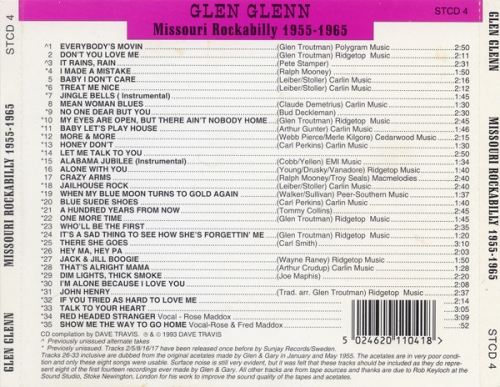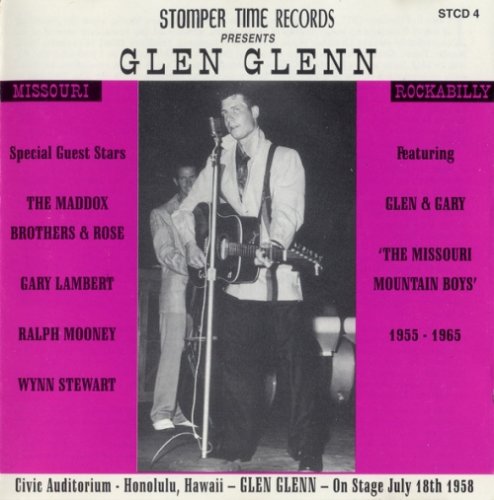
Glen Glenn - Missouri Rockabilly 1955-1965 (1993)
BAND/ARTIST: Glen Glenn
- Title: Missouri Rockabilly 1955-1965
- Year Of Release: 1993
- Label: Stomper Time Records
- Genre: Oldies, Rockabilly
- Quality: Flac (tracks, .cue, log)
- Total Time: 01:17:06
- Total Size: 325 Mb (scans)
- WebSite: Album Preview

Tracklist:
01. Everybody's Movin'
02. Don't You Love Me
03. It Rains Rain
04. I Made A Mistake
05. Baby I Don't Care
06. Treat Me Nice
07. Jingle Bells
08. Mean Woman Blues
09. No One Dear But You
10. My Eyes Are Open But There's Nobody Home
11. Baby Let's Play House
12. More And More
13. Honey Don't
14. Let Me Talk To You
15. Alabama Jubilee
16. Alone With You
17. Crazy Arms
18. Jailhouse Rock
19. When My Blue Moon Turns To Gold Again
20. Blue Suede Shoes
21. A Hundred Years From Now
22. One More Time
23. Who'll Be The First
24. It's A Sad Thing To See How She's Forgettin' Me
25. There She Goes
26. Hey Ma, Hey Pa
27. Jack and Jill Boogie
28. That's All Right Mama
29. Dim Lights, Thick Smoke
30. I'm Alone Because I Love You
31. John Henry
32. If You Tried As Hard To Love Me
33. Talk To Your Heart
34. Red Headed Stranger (vocal Rose Maddox)
35. Show Me Thye Way To Go Home (vocal Rose & Fred Maddox)
While he never gained the same fame and public recognition as such fellow West Coast rockabilly pioneers as Eddie Cochran and Ricky Nelson, Glen Glenn's talent far outweighed his luck in the music business, and his classic sides have become the stuff of legend among rockabilly fans as well as such roots rock giants as Bruce Springsteen, Tom Petty, and Bob Dylan, all of whom have covered his tunes on-stage.
Glenn was born as Orin Glenn Troutman on October 24, 1934, in Joplin, MO. Troutman was raised on the classic traditional country sounds of the deep South (and was related to Porter Wagoner by marriage), and when his family relocated to San Dimas, CA, in 1948, his enthusiasm for classic country and Western swing sounds continued to grow. By the time he was 17, Troutman had bought a guitar and had started jamming with Gary Lambert, a gifted guitar picker who went to the same high school as Troutman and had also started listening to the new R&B sounds which were pouring into California's airwaves. Troutman and Lambert formed a country duo called the Missouri Mountain Boys, and they began making the rounds of Los Angeles's country bars, with Troutman dropping out of high school to devote himself to music full time.
Eventually, Troutman and Lambert landed a regular spot on a local television show devoted to country music, where they made friends with another local artist with a distinctive style, Eddie Cochran. Lambert cuts some demos with Cochran, and Troutman was strongly influenced by Cochran's blend of country twang and R&B rhythm. Soon Troutman was dropping R&B and rockin' country tunes into their sets, and after editing his name to Glen Trout, he began touring steadily and cutting demos for a variety of labels, mostly with but occasionally without Lambert. In late 1957, Troutman finally landed a deal with L.A.'s ERA Records, and in January of 1958 his first single was released, the superb "Everybody's Rockin'" backed with "I'm Glad My Baby's Gone." However, Troutman soon received two less-than-welcome surprises -- without consulting him, ERA has bestowed a new stage name on him, Glen Glenn, and the rising star received his draft notice in the mail. (Lambert was also drafted around the same time.) While ERA continued to release material on Glenn, with the artist unable to promote the records, most received little notice, and while rockabilly collectors would later regard such sides as "Blue Jeans and a Boy's Shirt," "One Cup of Coffee," and "Laurie Ann" as classics, outside of California they fell upon deaf ears.
When Troutman and Lambert were discharged from the Army in 1960, they attempted to pick up their careers where they left off, but by that time rockabilly had fallen out of favor and ERA had moved Glenn to their subsidiary label Dore Records, where they tried to polish him into a well-scrubbed pop crooner. While the results weren't as dire as one might fear, the records didn't sell especially well, and Troutman dropped out of music full-time shortly afterward, though both he and Lambert continued to perform on weekends. A country side Troutman and Lambert cut in 1961 found belated release in 1964, which would have marked the end of Glenn's recording career if a British label hadn't released a compilation of his rare rockabilly material in 1977. Like many lesser-known American rockabillies, Glenn soon developed a passionate following in the U.K., and in 1984 Troutman cut a new Glenn album with Lambert for the Ace label. Since them, Glenn has become a regular fixture on the California club scene, and stages occasional European tours. ~ Mark Deming
Glenn was born as Orin Glenn Troutman on October 24, 1934, in Joplin, MO. Troutman was raised on the classic traditional country sounds of the deep South (and was related to Porter Wagoner by marriage), and when his family relocated to San Dimas, CA, in 1948, his enthusiasm for classic country and Western swing sounds continued to grow. By the time he was 17, Troutman had bought a guitar and had started jamming with Gary Lambert, a gifted guitar picker who went to the same high school as Troutman and had also started listening to the new R&B sounds which were pouring into California's airwaves. Troutman and Lambert formed a country duo called the Missouri Mountain Boys, and they began making the rounds of Los Angeles's country bars, with Troutman dropping out of high school to devote himself to music full time.
Eventually, Troutman and Lambert landed a regular spot on a local television show devoted to country music, where they made friends with another local artist with a distinctive style, Eddie Cochran. Lambert cuts some demos with Cochran, and Troutman was strongly influenced by Cochran's blend of country twang and R&B rhythm. Soon Troutman was dropping R&B and rockin' country tunes into their sets, and after editing his name to Glen Trout, he began touring steadily and cutting demos for a variety of labels, mostly with but occasionally without Lambert. In late 1957, Troutman finally landed a deal with L.A.'s ERA Records, and in January of 1958 his first single was released, the superb "Everybody's Rockin'" backed with "I'm Glad My Baby's Gone." However, Troutman soon received two less-than-welcome surprises -- without consulting him, ERA has bestowed a new stage name on him, Glen Glenn, and the rising star received his draft notice in the mail. (Lambert was also drafted around the same time.) While ERA continued to release material on Glenn, with the artist unable to promote the records, most received little notice, and while rockabilly collectors would later regard such sides as "Blue Jeans and a Boy's Shirt," "One Cup of Coffee," and "Laurie Ann" as classics, outside of California they fell upon deaf ears.
When Troutman and Lambert were discharged from the Army in 1960, they attempted to pick up their careers where they left off, but by that time rockabilly had fallen out of favor and ERA had moved Glenn to their subsidiary label Dore Records, where they tried to polish him into a well-scrubbed pop crooner. While the results weren't as dire as one might fear, the records didn't sell especially well, and Troutman dropped out of music full-time shortly afterward, though both he and Lambert continued to perform on weekends. A country side Troutman and Lambert cut in 1961 found belated release in 1964, which would have marked the end of Glenn's recording career if a British label hadn't released a compilation of his rare rockabilly material in 1977. Like many lesser-known American rockabillies, Glenn soon developed a passionate following in the U.K., and in 1984 Troutman cut a new Glenn album with Lambert for the Ace label. Since them, Glenn has become a regular fixture on the California club scene, and stages occasional European tours. ~ Mark Deming
Oldies | Rock | FLAC / APE | CD-Rip
As a ISRA.CLOUD's PREMIUM member you will have the following benefits:
- Unlimited high speed downloads
- Download directly without waiting time
- Unlimited parallel downloads
- Support for download accelerators
- No advertising
- Resume broken downloads


